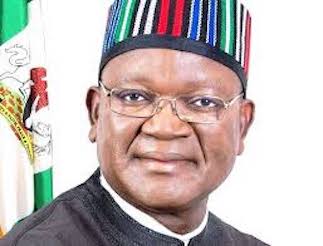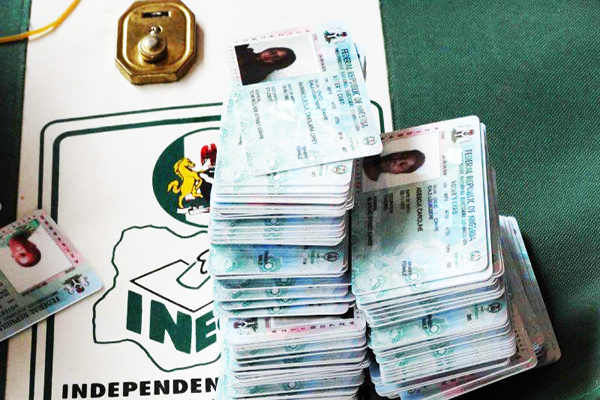COVER
Benue Panel Recommends Additional District to End Communal Clashes

From Vincent Nyinongu, Makurdi
The committee set up by the Benue State Government to investigate the recent communal crises between Mbawa and Ipusu communities in Tyo-Mu in Makurdi Local Government Council has recommended the creation of an additional district in the area as part of measures to end the lingering crisis.
Chairman of the committee and Secretary to the State Government, Prof.
Anthony Ijohor, SAN, stated this yesterday, at the Benue Peoples House Makurdi while presenting the report of the findings to Governor Samuel Ortom.“Government should create an additional district within the Fiidi Council Ward with headship from Mbawa extraction, with kindreds under it whose leadership will rotate among the Mbawa, Ugondo and Ipusu,” Prof.
Ijohor said.The committee which also recommended the provision of social amenities at Tyo-Mu said construction of a permanent base for the State Mobile Police Squadron and Police Station in the area will deter criminal gangs from operating.
Other recommendations include demarcation and issuance of titles to those allocated plots of land, withdrawal of court cases and punishment of culprits fueling the crisis and provision of relief to those whose properties were destroyed but were not parties to the crisis, among other recommendations.
Receiving the report, Governor Ortom appealed to indigenes of the state to always employ dialogue as a means of resolving disputes among individuals and communities.
He maintained that dialogue remains the best approach in handling crisis, stressing that although people are free to settle anywhere they wish, they should also be guided by authorities in their places of abode.
While directing the presentation of a memo to the State Executive Council for deliberations and production of a white paper on the report, the Governor reminded the people that the land for which they fight people fight will consume them when they die.
The governor acknowledged the support and contributions of security agencies, traditional rulers, committee members and other critical stakeholders in ensuring the return of peace in the area.
Members of the committee included the six Tiv first class traditional rulers, heads of security agencies in the state, chairmen of Makurdi and Guma local government areas among others.
COVER
NUPRC Sets 2026 Oil Output Target at 2.5m Barrels Daily

The Nigerian Upstream Petroleum Regulatory Commission (NUPRC) said the country is on track to achieve a crude oil production target of 2.5 million barrels per day by 2026.NUPRC Chief Executive, Gbenga Komolafe, said this yesterday in Abuja during the 4th PENGASSAN and Labour Summit (PEALS 2025).
The summit was themed “Building a Resilient Oil and Gas Sector in Nigeria: Advancing HSE, ESG, Investment and Incremental Production. ”He noted that Nigeria’s current oil output had increased from 1.46 million barrels per day in Oct. 2024 to 1.8 million barrels per day, with momentum building toward the 2026 target.He credited the recent Presidential Executive Orders under the Petroleum Industry Act (PIA) 2021 for shortening contracting cycles, reducing investment risks, and encouraging upstream projects.Komolafe highlighted the commission’s efforts in deepwater exploration, reactivation of dormant fields, and adoption of enhanced recovery techniques.He also referenced a recent Deepwater Technical Stakeholders’ Workshop, which focused on unlocking more than 810,000 barrels per day in new production.He outlined a cluster development strategy aimed at reducing costs, sharing infrastructure, and strengthening investor confidence.On sustainability, Komolafe said the NUPRC’s Upstream Decarbonisation Framework targeted the elimination of routine gas flaring by 2030 and a 60 per cent reduction in methane emissions by 2031.Nigeria’s 210 trillion cubic feet of gas reserves, he added, would play a key role in the energy transition.He called for stronger collaboration between government, industry, and labour, stressing that resilience in the sector must be a deliberate effort.Managing Director of ExxonMobil, Jagie Baxi identified four critical factors for boosting Nigeria’s oil production: geology, cost, risk, and reward.He warned that in spite of Nigeria’s vast hydrocarbon resources, natural production decline, especially in deepwater operations, remained a challenge, with operators losing about 15% per cent output annually.Baxi noted that high drilling and operational costs in Nigeria deterred fresh investment.He stressed the need for risk-adjusted incentives to retain investor interest and urged improved collaboration among stakeholders to resolve disputes and revive underperforming fields. (NAN)COVER
Voter Registration:Northern CAN Mobilises Christians for Turn Out

By David Torough, Abuja
The Christian Association of Nigeria (CAN) in the 19 Northern states and the Federal Capital Territory (FCT) has urged Christians to seize the ongoing Continuous Voter Registration (CVR) exercise by the Independent National Electoral Commission (INEC) as an opportunity to prepare for active participation in the 2027 general elections.
In a statement by its Chairman, Rev. Yakubu Pam, Northern CAN described voter registration as both “timely and crucial,” stressing that obtaining a Permanent Voter’s Card (PVC) remains the gateway to effective participation in the democratic process. “As responsible citizens and followers of Christ, we have a moral and civic duty to contribute meaningfully to the future of our nation. Democracy thrives when the voices of the people are heard. We must not sit on the sidelines,” Rev. Pam stated.He called on Christians of voting age, especially first-time voters, those who have relocated, or those yet to register, to turn out en masse for the exercise, adding that silence or indifference only empowers “the wrong forces to take control of the destiny of our nation.”The statement further urged churches, Christian organisations and community leaders across the North to mobilise their members for the registration, emphasising that the 2027 elections will be a defining moment for Nigeria.Meanwhile, INEC has clarified that the approved voting age under the Electoral Act remains 18, stressing that persons below that age cannot register even if they would have turned 18 by 2027.At separate engagements in Yobe and Sokoto states, Resident Electoral Commissioners (RECs) assured citizens that the CVR will be conducted smoothly, with security agencies fully mobilised to provide safety in identified flashpoints.INEC also restated that both online and physical registration will run for one year, targeting new voters, those with invalid PVCs, and citizens seeking transfers or corrections of details, while warning against multiple registrations.COVER
Nigeria’s External Reserves Hit $41bn, Highest in 44 Months

By David Torough, Abuja
Nigeria’s external reserves have surged to a four-year high of over $41 billion, a development the Presidency has hailed as a major economic milestone while taking a swipe at opposition leaders; Atiku Abubakar, Peter Obi and Nasir El-Rufai.According to the Central Bank of Nigeria (CBN), the gross reserves stood at $41,001,830,139.
96 as of August 19, 2025, with net reserves at $40. 3 billion, a level last seen in 2021, 44 months ago. Presidential spokesman Bayo Onanuga in a post on his official X handle yesterday described the achievement as evidence of “Prudent economic management” under President Bola Tinubu, adding that the increase was attained despite falling global oil prices.“The latest milestone was reached without massive inflows from oil sales. It’s all about the prudent management of the economy by President Bola Tinubu,” Onanuga wrote on X, noting that opposition leaders were unlikely to acknowledge the progress.He accused Atiku, Obi, El-Rufai and Babachir Lawal of being “blinded” by what he called a “doomed campaign to discredit Tinubu’s government.”The rise in reserves has been attributed to increased foreign exchange inflows, modest crude oil output gains, and recent CBN reforms, including the unification of exchange rate windows that boosted investor confidence.According to a report, the reserves’ strength now provides cover for more than 10 months of import needs, bolstering Nigeria’s foreign liquidity position.





























